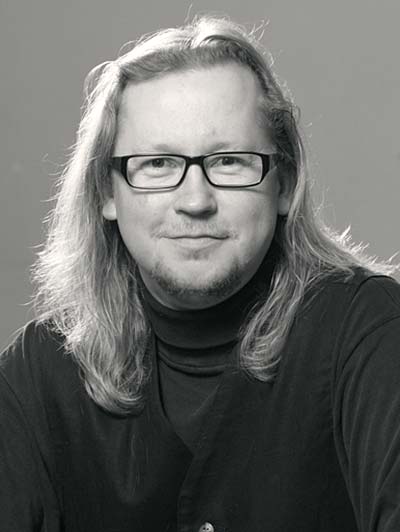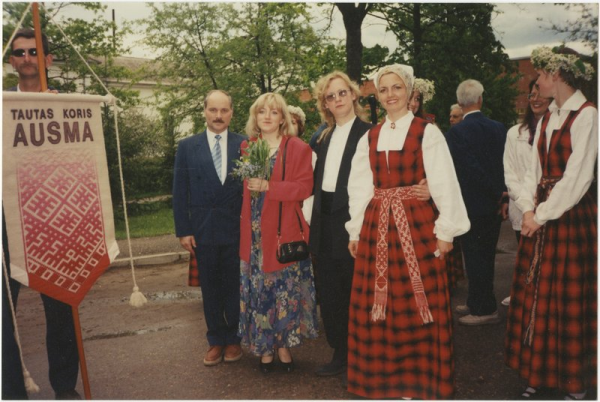Ivars Cinkuss
1969
Conductor, educator
Born 15 July 1969 in Rīga. Obtained his musical grounding in the Emīls Dārziņš Music School’s choir class, graduating in 1987. Studied at the Department of Choir Conducting at the Latvian Academy of Music under Professor Edgars Račevskis and furthered his education at the Westminster Choir College in Princeton, USA, graduating with a Master’s Degree in 1995.
Directed the Rīga Dome Boys’ choir (1996-1998), artistic director of the Rīga Technical University’s Gaudeamus male choir (since 1996) and of the SIA Latvija Statoil mixed choir Cantus Fortis (since 2007). From 2002 to 2013, was the artistic director of Collegium Vocale Ventspils, staging and performing more than 35 different programmes in cooperation with the Liepāja Symphony Orchestra, the Latvian National Symphony Orchestra, the Collegium Musicum Rīga baroque orchestra and other groups. Worked as guest conductor with the Latvija State Academic Choir, Liepāja Symphony Orchestra, Collegium Musicum Rīga, Rīgas kamermūziķi (Rīga Chamber Musicians) chamber orchestra and the Latvian Philharmonic Chamber Orchestra.
Also works professionally as a singer, performing as a solo baritone in a diverse range of genres. Under his guidance, the Latvian Radio Choir (1998-2004) created and recorded several programmes of early music, supplementing the radio’s archive of recordings. The versatile artist has participated in more than ten different musical theatre projects, such as the production of Escape from Troy by Baņuta Rubesa, the chamber opera Pilot at the Latvian National Opera and Viesturs Kairišs’ production of Mērnieku laiki (Time of the Land Surveyors) at the Latvian National Theatre. Has also worked in folklore and ethno-musical genres, including the Trio Šmite Kārkle Cinkuss ensemble (since 2008).
Worked as a vocal teacher at the Rīga Dome Choir School and at the Ventspils Music School, as well as leading conducting workshops and seminars in Latvia, Germany, England, Sweden, USA, Canada, Australia, where he talked about the history and development of Latvian choirs, vocal phonetics and stylistic choral music issues.
A chief conductor at the XXIIIrd-XXVIIth All-Latvian Song Festivals, Artistic Director of the XXIIIrd All-Latvian Song and XIIIth Dance Festival opening concert Teiksma par latvieti (A Latvian’s Tale) and XXVth All-Latvian Song and XVth Dance Festival Song Celebration/concluding concert Līgo, chief conductor at the XIIth US All-Latvian Song Festival in Indianapolis and XVth US All-Latvian Song Festival in Minnesota, chief conductor of Rīga male choirs (since 2003), and Ventspils City and District (2002-2021) choirs.
“... what we do in the context of the Song Festival is a phenomenon unique to us. Nowhere else in the world do 16 000 singers get together and sing a cappella in four-part, five-part harmony under the direction of a single conductor. When we thought about translating Dziesmu svētki into English, we thought that these festivals cannot be called just a song festival because that doesn’t nearly reflect what it is. Thousands of song festivals take place around the world, where people come together and sing something. A similar event to ours is still alive in Estonia, but not even in Lithuania, they have transformed theirs into a “singing festival”. Many people in Latvia have also suggested this, but ours is not a singing festival. We have singing festivals every summer in every bigger or smaller town. What happens in Mežaparks every five years does not have to made into what happens every summer all over the country. The Celebration of Song concluding concert has a totally different sacred value, another artistic value, and also goals. It’s not a festival where the audience has to hum along with all the songs. I mean, when we go to a church to listen to a concert, do we also ask to hum along?” (Rušeniece, Līga. Ivars Cinkuss: Man aspires to what he lacks). Nra.lv, 12 April 2017)
Was awarded the Latvian Ministry of Culture and Rīga City Council Annual Prizes in 2006 for his production of Henry Purcell’s opera Dido and Aeneas in Ventspils and the promotion of the male-choir movement in Latvia.






